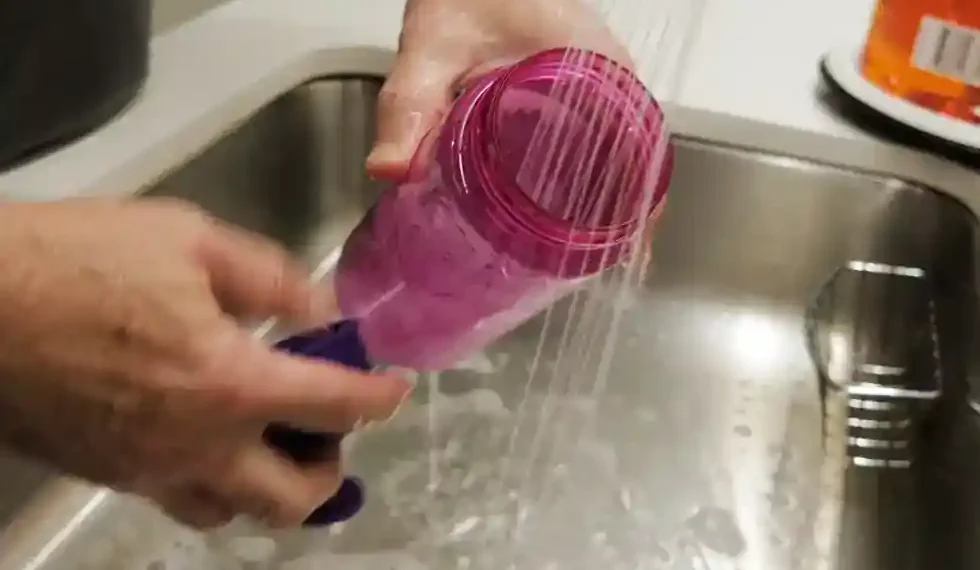Reusable water bottles are a staple for hydration, but even bottles filled with plain water can become breeding grounds for germs. Experts stress that regular cleaning is essential to avoid potential health risks and keep your drinking water safe.
Why Water Bottles Get Dirty
Every sip introduces bacteria from your mouth, and touching lids or straws transfers germs from your hands. Bottles often have narrow openings, crevices, and threads that trap moisture, creating ideal conditions for mold and bacterial growth.
“It seems like something mundane, but it is extremely important,” said Michele Knepper, a nurse practitioner at the University of Pittsburgh Medical Center.
Neglecting to clean bottles can lead to minor health issues such as stomach discomfort or throat irritation, and may worsen allergies or asthma in some individuals.
Cleaning Basics: Simple Yet Effective
All bottle materials—plastic, glass, or metal—can harbor bacteria, though plastic bottles may scratch more easily, creating additional microbial hiding spots.
The simplest cleaning method is also one of the most effective: scrub the inside and outside with warm, soapy water using a sponge or bottle brush. Rinse thoroughly and let the bottle air dry before the next use. Specialized brushes or pipe-cleaner tools can reach straws and tight corners.
For a deeper clean, bottles that are dishwasher-safe can be placed in the dishwasher. Alternatively, dissolve a denture or retainer-cleaning tablet in water overnight, or scrub with a warm solution of vinegar or baking soda.
Experts recommend a daily rinse and wash for general use, with a more thorough weekly cleaning. If daily washing feels burdensome, aim for at least every few days while maintaining good habits, like rinsing the mouthpiece after each refill, said Dr. Mike Ren, a family medicine physician at Baylor College of Medicine.
When to Clean More Frequently
If your bottle holds sugary drinks, protein shakes, or sports beverages, cleaning after each use becomes critical. Residues from these liquids provide a nutrient-rich environment that bacteria thrive on.
Is It Safe to Leave Water Overnight?
Opinions vary on leaving water in bottles overnight. Some experts recommend discarding any remaining liquid at each refill, while others say water can safely remain for several hours. Ren suggests that leaving water overnight is generally fine, but old water should not sit for more than a few days.
“Guidelines are guidelines,” Ren said. “Everyone’s going to do it a little bit differently.”
Bottles with visible mold, strange smells, or discoloration should be cleaned immediately, and disposable plastic bottles should not be reused due to cracks and chemical leaching risks.
Maintaining a Healthy Routine
Even minor daily habits can have a meaningful impact on health. Ivy Sun, a hospitality expert at Georgia Southern University who studies water bottle contamination, washes her and her children’s bottles with soap and water every day.
“This is just a very small step that we do, but it can largely help with our health,” Sun said.
Regular cleaning may seem simple, but it ensures that a reusable water bottle remains a safe, hygienic companion for daily hydration.
This article was rewritten by JournosNews.com based on verified reporting from trusted sources. The content has been independently reviewed, fact-checked, and edited for accuracy, neutrality, tone, and global readability in accordance with Google News and AdSense standards.
All opinions, quotes, or statements from contributors, experts, or sourced organizations do not necessarily reflect the views of JournosNews.com. JournosNews.com maintains full editorial independence from any external funders, sponsors, or organizations.
Stay informed with JournosNews.com — your trusted source for verified global reporting and in-depth analysis. Follow us on Google News, BlueSky, and X for real-time updates.














